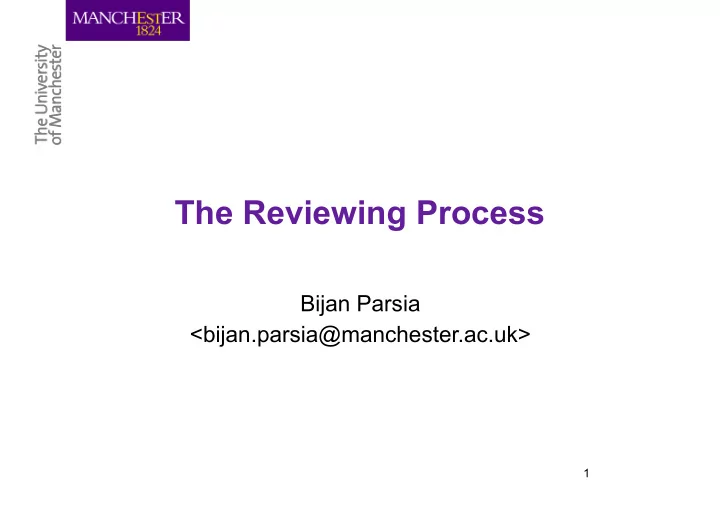

The Reviewing Process Bijan Parsia <bijan.parsia@manchester.ac.uk> 1
Peer Review • Peer review is a keystone of modern academia – Evaluation by people of “similar competence” • Where there’s a fairly high bar for minimally sufficient competence • No “external” gatekeepers • The community of practice enforces standards – “Locally” e.g., within a subfield, field, or discipline – “Globally”, i.e., across academia • Peer review at different stages – Collegial feedback and discussion – Gatekeeping publications (refereeing, editing, soliciting) • What we typically mean – Determining career moments (e.g., viva, promotion) – Ongoing engagement in the literature • Key aspect of academic freedom!
Academic Freedom “...academic staff have freedom within the law to question and test received wisdom , and to put forward new ideas and controversial or unpopular opinions , without placing themselves in jeopardy of losing their jobs or privileges they may have at their institutions;” — Education Reform Act 1988 (This act also abolished academic tenure in the UK!!!!!!) • Negative academic freedom – You cannot lose things • Positive academic freedom – You have support • And yet – In a resource constrained society we must make choices http://www.ucu.org.uk/media/pdf/l/r/ucu_earlycareer_acfreedomguide.pdf
What Peer Review Doesn’t Do • (Let’s focus on refereeing) • It doesn't guarantee truth! – How could it? • It doesn’t guarantee quality! – People are overloaded – People are distracted – People are biased • It doesn’t protect against malpractice! – It helps mitigate fraud and other malpractice – See above – Also, fraud circles • It doesn’t necessarily improve your work! – Sometimes it makes it worse! – The dreaded second reviewer
Retraction • Sometimes papers are retracted! – Relatively rare, even for “bad” papers – Most critical for malpractice • Fraud, plagiarism, etc. • Whether intentional or not – Sometimes done for severe error – Result of both self- and other-policing • Worth attending to – Cf Retraction Watch • http://retractionwatch.com • Seems to be down right now
A Reviewing Process • Situate the paper – What’s the gene, audience, venue, and purpose? • Skim the paper – Get the gist – Look at the major structural features – Note tricky bits, highlights, or possible problem areas • Read carefully – Section by section and paragraph by paragraph • For each section and paragraph, ask: – Do I know what’s being claimed? – Do I know why it exists and why it’s here? – Do I know how it fits in with the rest? – Take notes on Content, Structure, and Style • Reflect!
Reflection • Were your “skim” impressions accurate? – If not, why not? • What’s the major takeaways from the paper? – Why should someone read the paper? • What are the strengths? • What are the weaknesses? • What is your overall impression?
Write Up the Review • Make sure you know the review standards … – One line reviews are rarely acceptable – Hundreds of pages of comments on typos are rarely acceptable – Tone standards vary, but being abusive is discouraged • Blunt and direct is usually good, but standards vary • and structure – There’s often a form or at least basic guidance – Generic: • Major comments – Content – Structure – Style • Minor comments – Similar – See “reflection” slide!
In Most Reviews • Content discussion dominates – Is what’s claimed plausibly true? – Is there good evidence for the claims? – Are the claims interesting? – Are the claims well situated? – Etc. • Structure and style – Can be reasons to reject! – Probably dominate your reviews in this course • Which is ok! – Should strive to be constructive • Not just what’s wrong but how to fix • You do not need to correct all typos! – Unless you are explicitly proofreading
Reviewing What You Don’t Know • You will be reviewing things you don’t understand – In class, obviously – In general (e.g., for end of year interviews etc.) – In your field! • Bluffing isn't a good idea – Don’t pretend you understand what you don’t – Choices: • Withdraw (I’m not competent to review it) • Research (become competent) • Review from a “naive perspective” – Even if you don’t understand it all » You might spot problems (not just in structure or style)! » Or offer advice for making it more accessible » Of ask useful questions!
In Class • Be prepared to review the reviews! – Do you understand the review? – Does it help your paper? – Did it miss something? – Did it catch something you didn’t notice? – Is it constructive? – Is it insightful? • The best reviews are (mostly) content oriented – Though sometimes extremely helpful presentation comments happen!
Recommend
More recommend